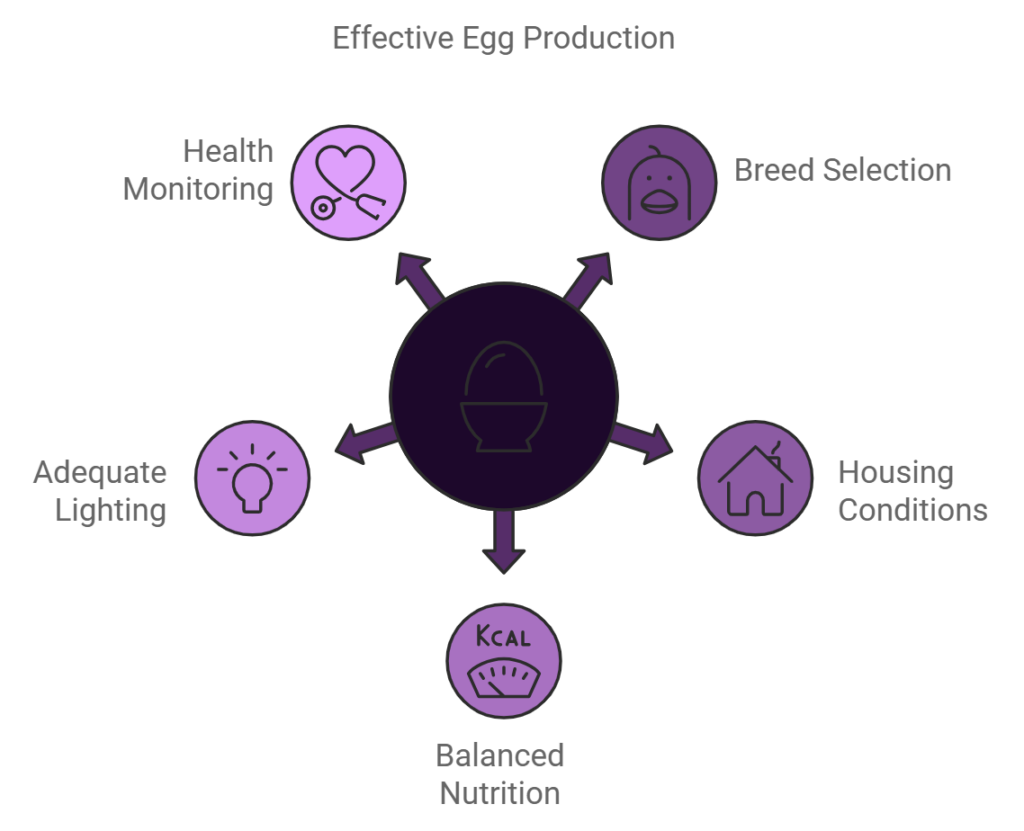Selling Eggs – Boost Your Profits Today

Envision awakening to the soft clucking of hens, understanding that every egg they produce advances you towards your objectives. Whether you’re a hobbyist looking to make some extra cash or you’re considering a full-fledged business venture, selling eggs can be a rewarding opportunity.
With growing demand for fresh, organic produce, the egg market is ripe for exploration. However, to succeed, one must navigate the intricacies of production, marketing, and distribution effectively.
By understanding key strategies and challenges, you can turn this venture into a profitable endeavor. Let’s delve into the world of selling eggs and discover how to make your mark.
Understanding the Egg Market
Understanding a few essential components is necessary to navigate the egg market. Free-range and organic eggs are becoming more and more popular, according to demand patterns. Prices can differ, but because organic products are thought to be of superior quality, they are frequently more expensive.

Adherence to regional health laws is essential for market access, guaranteeing that all manufacturing procedures fulfil necessary criteria. Supply is influenced by seasonality, which also affects availability and cost.
Profit margins can also be impacted by investigating different distribution channels, such as direct consumer sales or retail shops. Understanding these elements can help you navigate the dynamic and ever changing egg market.
Factors to Consider Before Selling Eggs
When venturing into the egg-selling business, it’s crucial to evaluate several key factors:
- Local Regulations: Ensure compliance with zoning laws and health standards that govern poultry farming in your area.
- Production Capacity: Determine the number of hens you can sustain while maintaining quality and welfare.
- Market Research: Identify the target audience and understand the competitive landscape in your locality.
- Cost Analysis: Calculate initial and ongoing expenses, including feed, housing, and necessary equipment.
- Quality Control: Develop robust practices to maintain the freshness and safety of your eggs for consumers.
These considerations will guide you in establishing a successful egg-selling venture.
Effective Egg Production Techniques
To enhance egg production effectively, several techniques can be adopted:

- Breed Selection: Opt for high-yielding breeds such as Rhode Island Reds or Leghorns, known for their prolific laying capabilities.
- Housing: Ensure coops provide sufficient space, good ventilation, and protection from predators to promote a stress-free environment.
- Nutrition: A balanced diet rich in calcium and protein is essential. This helps maintain the quality and quantity of eggs.
- Lighting: Adequate lighting, especially in winter, can help maintain regular laying patterns. Artificial lights can be used to simulate longer daylight hours.
- Health Monitoring: Regular checks for diseases and parasites are vital. Maintaining flock health ensures consistent egg production.
By implementing these methods, egg producers can achieve optimal results in their egg-laying endeavors.
Marketing and Selling Strategies
When it comes to selling eggs, a well-thought-out marketing and selling strategy is crucial. Effective packaging and branding can set your eggs apart, making them more appealing to buyers.

Choosing the right distribution channels can help you reach your target market efficiently. Additionally, deciding between online and offline sales can impact your business’s reach and customer engagement. Let’s dive into these strategies to enhance your egg-selling business.
Packaging and Branding
- Custom Packaging: Use personalized cartons that reflect your brand identity.
- Labeling: Ensure labels include essential information like expiration dates and nutritional facts.
- Design: Invest in eye-catching designs to attract customers.
Distribution Channels
- Direct Sales: Sell at farmers’ markets or through community-supported agriculture (CSA) programs.
- Retail Partnerships: Collaborate with local grocery stores or restaurants for a wider reach.
- Online Platforms: Utilize e-commerce sites to access a broader customer base.
Online vs. Offline Sales
Let’s explore the pros and cons of each method to help you make an informed decision.
- Online Sales Pros:
- Broad audience reach
- Convenience for customers
- Online Sales Cons:
- Shipping costs may reduce profit margins
- Requires effective digital marketing
- Offline Sales Pros:
- Direct customer interaction builds trust
- No shipping concerns
- Offline Sales Cons:
- Limited market reach compared to online options
- Dependence on local demand fluctuations
Also Read: Polish Chicken – The Alluring History and Show Secrets
Challenges and Solutions in Selling Eggs
Engaging in the egg-selling business can present unique hurdles, yet identifying effective solutions can pave the way for success. Two significant challenges are managing seasonal fluctuations and meeting customer expectations.
By exploring strategic approaches, sellers can address these issues effectively and maintain a thriving business. Let’s delve into these challenges and uncover practical solutions to navigate the egg market efficiently.
Dealing with Seasonal Fluctuations
Managing the ups and downs of egg demand throughout the year can be tricky. Here are some strategies to stabilize production and sales:
- Production Planning: Maintain flocks of varying ages to ensure a consistent egg supply year-round.
- Storage Solutions: Use refrigeration to extend the shelf life of eggs during periods of low demand.
- Diversification: Offer a range of egg products, such as pickled or quail eggs, to appeal to different consumer preferences.
Managing Customer Expectations
Meeting customer expectations is crucial for building trust and ensuring repeat business. Consider these approaches:
- Quality Assurance: Implement stringent quality control measures to ensure high standards.
- Timely Delivery: Establish reliable delivery schedules to meet customer timelines.
- Clear Communication: Keep customers informed about product availability and any changes in service through transparent communication channels.
FAQs
What are the key factors influencing the egg market?
The egg market is shaped by demand trends, pricing, and regulatory requirements. Organic and free-range eggs are gaining popularity, often commanding higher prices. Compliance with health regulations is necessary for successful market entry.
What should I consider before starting an egg-selling business?
Before starting, assess local regulations, and your production capacity, and conduct market research. Analyze costs involved in feed, housing, and equipment. Ensure quality control to maintain egg safety and consumer satisfaction.
How can I maximize egg production?
Selecting high-yielding breeds and providing proper housing are crucial. Nutrition management, lighting control, and regular health checks can significantly improve egg production and quality.
What are effective marketing strategies for selling eggs?
Focus on attractive packaging and clear branding. Explore varied distribution channels, including direct sales, retail partnerships, and online platforms, to reach a broader audience and maximize sales potential.
How can I manage seasonal fluctuations in egg sales?
Plan production by maintaining flocks of different ages to ensure a steady supply. Investing in refrigeration can help extend egg shelf life during periods of low production, tackling seasonal demand changes effectively.
Conclusion
Selling eggs involves understanding market dynamics, considering various factors, and employing effective production techniques. By exploring packaging, branding, and distribution channels, one can enhance their marketing and selling strategies.
Addressing challenges like seasonal fluctuations and managing customer expectations is crucial for success in the egg business. It’s important to note that staying informed and adaptable will ensure long-term viability and growth in this industry.
Whether you’re just starting or looking to optimize your existing egg-selling venture, the key is to remain diligent and proactive.
Eager to learn more? Explore our other insightful blogs to gain valuable tips and strategies for your business journey!
